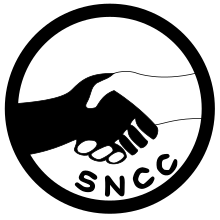Student Nonviolent Coordinating Committee
 |
|
| Formation | 1960 |
|---|---|
| Extinction | 1976 |
| Purpose |
Civil Rights Movement Anti-racism Participative democracy Pacifism |
| Location |
|
| Marion Barry | 1960–61 |
| Charles F. McDew | 1961–63 |
| John Lewis | 1963–66 |
| Stokely Carmichael | 1966–67 |
| H. Rap Brown | 1967–68 |
| Phil Hutchings | 1968–69 |
The Student Nonviolent Coordinating Committee (SNCC, often pronounced /ˈsnɪk/ snick) was one of the most important organizations of the Civil Rights Movement in the 1960s. It emerged from a student meeting organized by Ella Baker held at Shaw University in April 1960. SNCC grew into a large organization with many supporters in the North who helped raise funds to support SNCC's work in the South, allowing full-time SNCC workers to have a $10 per week salary. Many unpaid volunteers also worked with SNCC on projects in Mississippi, Alabama, Georgia, Arkansas, and Maryland. SNCC played a major role in the sit-ins and freedom rides, a leading role in the 1963 March on Washington, Mississippi Freedom Summer, and the Mississippi Freedom Democratic Party over the next few years. SNCC's major contribution was in its field work, organizing voter registration drives all over the South, especially in Georgia, Alabama, and Mississippi.
A final SNCC legacy is the destruction of the psychological shackles which had kept black southerners in physical and mental peonage; SNCC helped break those chains forever. It demonstrated that ordinary women and men, young and old, could perform extraordinary tasks.
In the later 1960s, led by fiery leaders such as Stokely Carmichael, SNCC focused on black power, and then protesting against the Vietnam War. As early as 1965, organization leader James Forman said he "did not know how much longer we can stay nonviolent" and in 1969, SNCC officially changed its name to the Student National Coordinating Committee to reflect the broadening of its strategies. It passed out of existence in the 1970s.
...
Wikipedia
